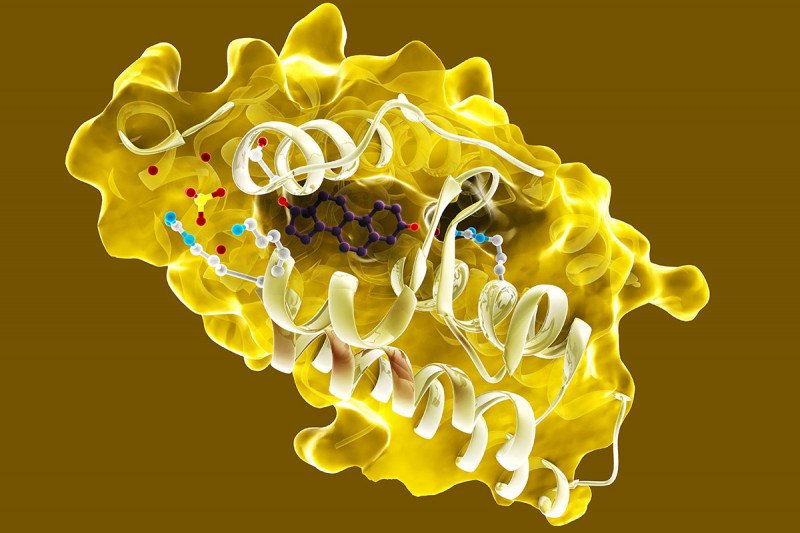
For many people with breast cancer, drugs that target proteins driving the cancer’s growth have made a huge difference in fighting the disease. But for those with triple-negative breast cancer — a subtype defined by what it lacks rather than by its own characteristics — there are fewer good options.
Now doctors are finding an unlikely therapy for treating some of these tumors: drugs that were originally developed to treat prostate cancer. Results from a new multicenter trial published in the Journal of Clinical Oncology (JCO) report success with this approach. Memorial Sloan Kettering is at the forefront of this research.
“There is a great unmet need for novel, active therapies for patients with triple-negative breast cancer,” says MSK Breast Medicine Service medical oncologist Tiffany A. Traina, who is leading many of these efforts and was first author of the new study. “We have many women with advanced triple-negative breast cancer looking for clinical trials because standard chemotherapy options aren’t always enough for them.”
Different Breast Cancer Subtypes, Different Treatments
The three most common proteins known to fuel breast cancer growth are the estrogen receptor, the progesterone receptor, and the HER2 receptor. Estrogen and progesterone are female hormones that help regulate the menstrual cycle, among other functions. Drugs that block estrogen, such as tamoxifen and the class of drugs called aromatase inhibitors, can slow or stop the growth of tumors with these receptors.
Breast cancers with growth driven by the HER2 receptor can be treated with drugs that block this receptor, such as trastuzumab (Herceptin®) and others.
About 15% of breast cancers, however, are defined as triple negative. This means they don’t have any of these receptors. It also means they don’t respond to drugs that target them. These cancers do respond to chemotherapy, and some studies have suggested they actually may respond better to chemotherapy than other subtypes. But chemotherapy has more side effects than these other, targeted drugs.
Triple-negative disease is more common in African Americans, younger women, and those whose cancer results from inherited mutations in the BRCA genes.
Finding an Unlikely Target for Triple-Negative Breast Cancer Treatment
It turns out that about half of triple-negative breast cancers carry another hormone receptor — the one for the male hormone androgen. In a landmark study more than ten years ago, the late MSK pathologist William Gerald was the first to report that some breast cancers could carry the androgen receptor. His research also found the androgen receptor was responsible for growth of the cancer. This opened up a possible new option for treating breast cancer with this type of hormone therapy. (Although estrogen and progesterone are considered female hormones and androgens are regarded as male ones, both types of hormones are found in people of both genders.)
- Enzalutamide was FDA approved in 2012.
- It is used to treat castration-resistant prostate cancer in people who have already received certain types of chemotherapy.
- The drug extends survival by about five months in people with advanced disease.
- Other androgen inhibitors being studied for breast cancer include seviteronel, bicalutamide, and abiraterone (Zytiga®).
In 2013, Dr. Traina was the first to lead a multicenter study showing that this approach may be effective in treating triple-negative breast cancer. That study used another androgen-targeting drug, called bicalutamide (Casodex®).
The recent JCO study reported results from 78 women with advanced triple-negative breast cancer that expressed the androgen receptor. The purpose of the phase II trial was to evaluate the safety and efficacy of the prostate cancer drug enzalutamide (Xtandi®). All participants were treated with the drug, which is given as a pill, once a day. The investigators found that 33% of people benefited from the drug. Survival also appeared longer than expected for triple-negative breast cancer. The only serious side effect was fatigue.
Enzalutamide was co-invented by physician-scientist Charles Sawyers, Chair of MSK’s Human Oncology and Pathogenesis Program. The drug targets multiple steps in the androgen receptor signaling pathway, making it more effective in treating prostate cancer than some other androgen-blocking drugs.
“What’s so exciting is that this research started at MSK,” Dr. Traina says. “It’s a true bench-to-bedside story that begins with a discovery in the lab and has led to many trials that may offer a new, effective treatment for patients with this highest-risk subset of breast cancer.”
Further Expanding Uses of Enzalutamide
“The findings from this study support the continued development of enzalutamide for the treatment of advanced triple-negative breast cancer,” Dr. Traina adds. Another recent study that Dr. Traina participated in also found that enzalutamide can provide benefit when added to an aromatase inhibitor called exemestane (Aromasin) in people whose breast cancer carries both estrogen and androgen receptors. The findings were presented at the recent San Antonio Breast Cancer Symposium.
In addition, she and her colleagues are studying enzalutamide in early-stage triple negative breast cancer. They are also looking at several other prostate cancer drugs that block the androgen receptor, both alone and in combination with other novel targeted therapies.
Dr. Traina and MSK breast medical oncologist Ayca Gucalp are also recruiting people for a new trial that would test androgen receptor–blocking drugs specifically in men with breast cancer. About 90% of male breast cancers carry the receptors for estrogen or progesterone, and studies suggest that most of them also carry the androgen receptor.
To learn more about this trial, call 646-888-5209.





